The Saints Row series started as a shameless knockoff of Grand Theft Auto’s real-world crime sprees. Those first few games were fine, but they lacked their own direction. With the third game, developer Volition tossed away any semblance of existing in reality and turned everything up to 11. By embracing the chaos, the team finally had something to make the franchise stand out, which resulted in one of the better games of that console generation.
However, as the titles kept upping that ante, they quickly saw diminishing returns. Having super powers inside of a Matrix-like simulation sounds fun on paper, but that need to keep one-upping themselves put the devs into a corner that it seemed like they might never get out of.
It’s been nearly a decade since we’ve gotten a proper entry to the mainline series, and Volition is using the Saints Row reboot to reset the narrative (and chaotic) table, while still giving fans the gameplay, open world, and laughs they’ve come to expect. Fortunately, that makes this an easy game to either recommend or not. Saints Row isn’t going to change your mind if you weren’t already a fan of the Saints’ unique brand of mayhem. But if you are, it makes intriguing changes to the formula that leaves the franchise in a much better place than it was following Gat out of Hell.
A refined brand of Saints
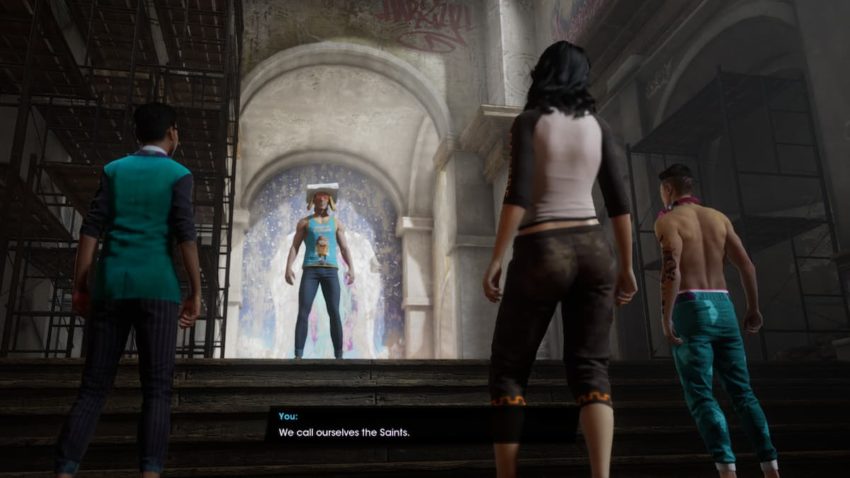
To be clear, this is the Saints Row game you know and love — or hate. Sure, they’ve slapped a new city and introduced a new set of characters into the formula, but everything is rooted in that purple-tinted glow. If you’ve never played a Saints Row game before, that means bombastic set piece missions, silly side quests that fluctuate from legitimately great to boring filler, a map dense with gags and collectibles, decent shooting that’s not going to win any awards, and its fair share of open-world jank.
Of course, the team at Volition hasn’t spent the last nine years doing nothing. There are several quality of life and gameplay improvements that make this feel like a good step forward for the Saints. The most immediately noticeable improvement is in the combat. As you progress, you’ll unlock all kinds of situational “powers.” I have to use that last word loosely given the past games, but these are mostly rooted in the real world. For example, the first one you unlock lets you stuff a grenade in an enemy’s mouth and then throw them at their friends. Later on, you’ll get a high-powered sniper rifle that lets you blow off your enemies’ heads from afar. From one side quest, you can unlock a deployable screen that lets you shoot through buildings. I did say “mostly.”
On top of that, you have a new Takedown ability that lets you melee any shieldless enemy at the press of a button. This is an important addition because it’s the only way to get health back. After you use it, you’ll need to refill a meter by getting kills, which makes you stay in combat if you want to heal up. You do get a power that gives you a shield that mitigates the need for Takedowns, but when the screen really starts to fill with enemies, you’ll still want that insta-kill in your back pocket. All of this means you’re not often using combat techniques and are instead pushing into the enemy to take them down, upping the chaotic nature. Unfortunately, Saints Row is a bit buggy (more on that later), and that extends to enemy A.I., which can leave them stuck in the environment, making it more like shooting fish in a barrel than a real gang fight.
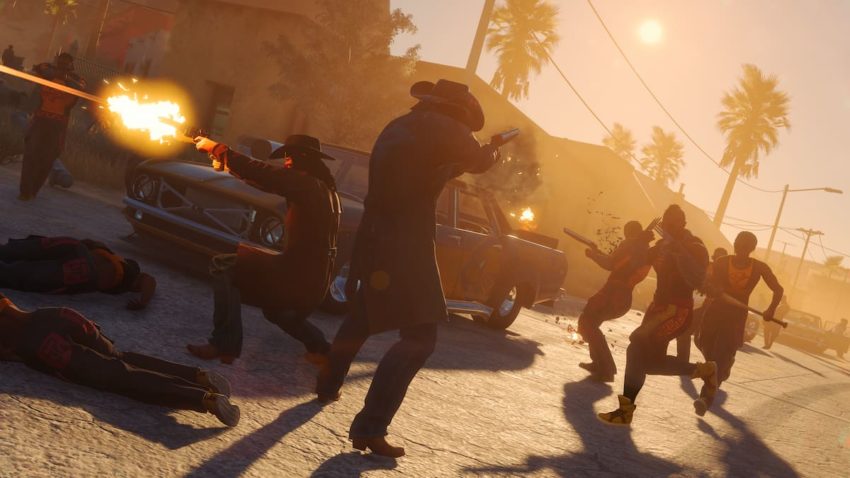
The reboot also adds a new wrinkle to upgrading your guns and vehicles. In the past, you simply had to go purchase things like nitrous or exploding bullets from a store. Now, you need to complete specific objectives to unlock them. This encourages experimentation, as a weapon might not reach its full potential until you use it to kill 30 special gang members. Some of these objectives can be a bit annoying to accomplish unless you’re specifically seeking them out, but overall, it’s a fun twist on improving your character’s arsenal.
Volition has also added a few features I haven’t seen in other open-world games that, in my opinion, should become mandatory. You know the classic open world trope where you have an NPC that needs to ride with you to an objective? You’d have to wait for them to hop in the car, often seeing them struggle to even complete this simple task. Saints Row gets rid of that completely. Your NPC friends just teleport into your car if you drive off without them, saving you all that hassle completely. You can also change cars (outside of a few exceptions) at any point in a mission. Did the vehicle you started the mission in end up in the river because of a poorly-timed drift? In most open-world games I’ve played, that’s a restart, but Saints Row doesn’t care. It just wants you to have a good time.
Of course, it wouldn’t be the Saints without a robust character creator. I was able to make a creepy, old man to my exact specifications and then dress him up in an all-denim suit. I do miss having the British accent as an option, but they’ve definitely gone all-out on this feature to make sure you can build a character that looks like you, or if you’re a freak like me, your wildest nightmare. To assist with the former, they have options to give your character prosthetics or build an asymmetrical face. Features like these makes it clear that Volition is stressing inclusion with this new version of The Boss.
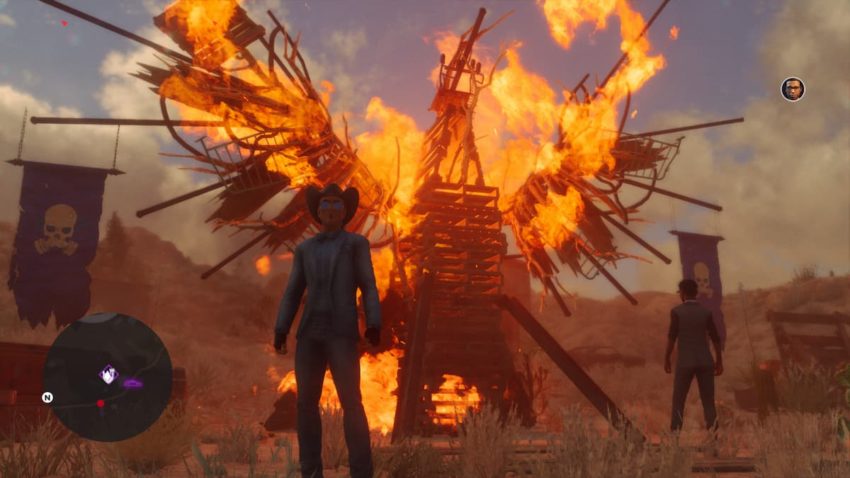
For the most part, this is all pretty seamless and improves the moment-to-moment gameplay from past titles while stripping you of most of the game-breaking superpowers of Saints Row IV. However, I would be remiss to not point out that, while doing all of this combat, you’re going to run into bugs. In my experience, none of these were game-breaking. In fact, outside of a few bugged missions that I had to restart, the bugs often make the game funnier. Is it really a deal-breaker to see a dude be randomly catapulted into the stratosphere for no reason? What about watching a parking lot suddenly become a game of Katamari Damacy when a stray explosion causes them to stick together? Those are just bonus features in my book. Saints Row also lets you set up multiple auto-save files, so you don’t need to worry too much about losing more than 10 minutes or so of progress.
That said, I can definitely see other players feeling differently. And, even if the bugs I ran into are mild, there’s some potential for it to be worse during your experience. That doesn’t knock my score, but I think it’s worth knowing going in. This is a massive open world with a lot going on. Sometimes those things run into each other in less than ideal ways and you find yourself in the final cutscene without a villain because his model got flung into the desert for some reason.
Keeping it strange
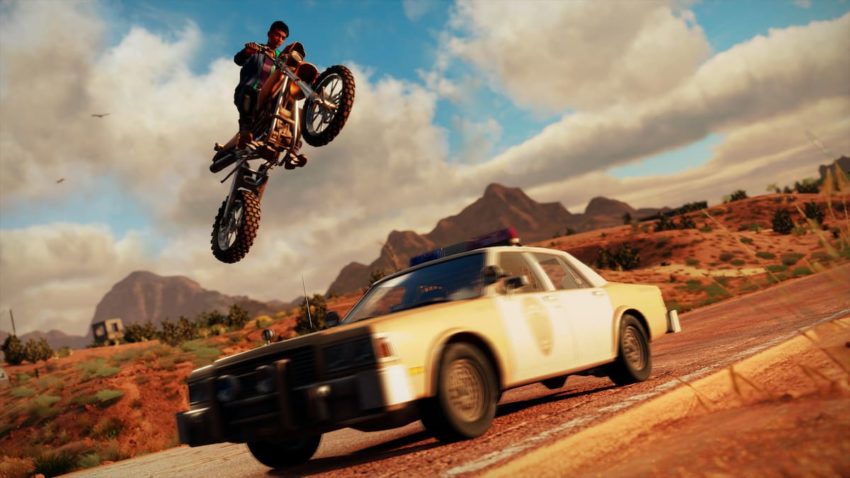
In any Saints Row game, the gameplay is only half of the battle. You also need a campaign full of missions that either leave you crying on the floor laughing or with your jaw hanging open at how over-the-top it is. The reboot does a pretty good job of knocking this aspect out of the park, but the final sequence definitely left me with a sour taste in my mouth.
That final mission just isn’t as grandiose as you’d expect given what you’ve seen leading up to it. I won’t spoil anything that happens here, but it feels like relatively small potatoes. On top of that, the whole thing ends kind of abruptly so that the team can save room for a sequel. That doesn’t mean it’s a cliffhanger, but I was expecting at least another act or two. It made me wish that the game had started earlier in your character’s timeline.
The game begins with your character already being friends with the three other protagonists. If there was a bit more leadup where you get to know Neenah, Kev, and Eli, that ending might not have hit as poorly. Plus, the team doesn’t really do much in terms of “loyalty” missions with your pals. There is one absolutely incredible sequence with Eli, but Neenah and Kev feel more like one-note, background characters than someone like Shaundi or Johnny Gat ever did. Had we spent more time with them, the team would have been able to use those relationships to give the ending a bit more weight and tie things together.
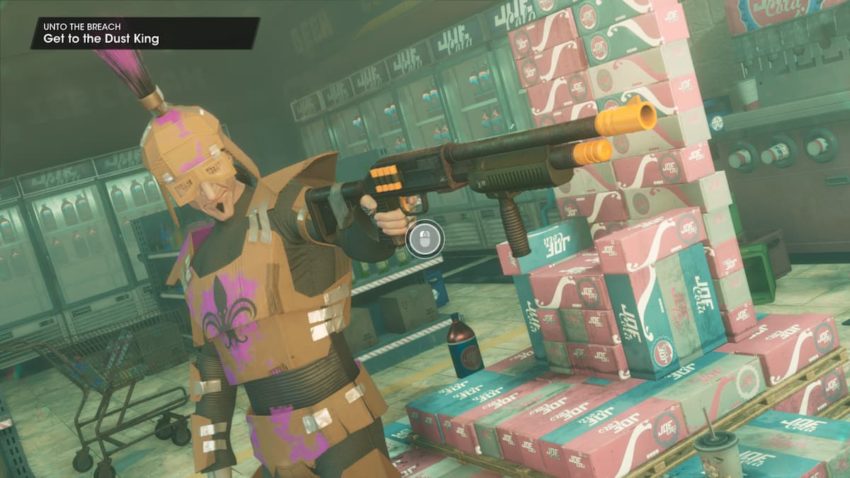
Again, it’s not like this is out of the realm of possibility. Eli’s side quest puts you on an entire LARPing-centric mission that brings in major characters from the main story and gives you a whole set of foam weapons. At one point, you even become “invisible” in the LARP by drinking a potion and crossing your arms in front of you. It’s absolutely ridiculous and shows how good this team is at comedy and setpieces. You don’t get that for Neenah and Kev and it feels like a waste of both their character development and Volition’s writing prowess.
The reboot does give you some control over where the side stories take you through the “Empire builder.” Essentially, this is just the means through which you’ll open the various side ventures. However, several of them are locked behind opening up a certain number of other ventures, so in practice, it’s really just a way for the developers to keep you from filling up your map with icons too quickly. It’s a neat idea but isn’t executed very well in this first foray. I’d love to have a bit more choice over how my Empire grows. Instead, we got what amounts to a hyped-up skill tree.
What is done exceptionally well is that open world I’ve talked so much about. Santo Ileso is the real star of Saints Row. Unlike Steelport or Stillwater, Santo Ileso is vibrant. There is so much color constantly thrown in your face. It really does feel like going to Las Vegas for the first time. There is a ton to see and Volition has done a great job at filling it up with unique buildings, signage, and citizens.
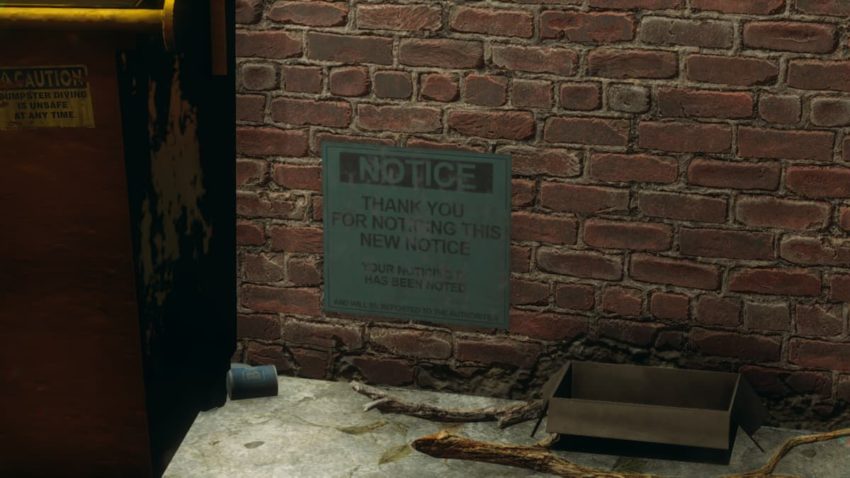
Of course, it must be noted that a lot of this is just fluff. You can’t go into most buildings. Heck, several of the shops are just roadside stands. You’re not going into sprawling building interiors very often. Even still, this is a city begging to be explored and you’re almost always rewarded with something that makes you laugh.
I spent several hours just walking around Santo Ileso, taking in the sights and searching for Easter eggs. I’ll save most of them for you to find, but Spaceballs fans will be happy to know there’s a giant comb found out in the desert that, unfortunately, hasn’t found anything. Seeing how much Volition has been able to pack into the city and its surrounding deserts is remarkable. Obviously, there are a few repeat stores, but every sector of the city feels unique, adding to that immersive experience of exploring a new city.
The verdict
For better or worse, Saints Row is exactly what you’ve come to expect from the series. Volition makes several important changes to gameplay and has really outdone itself with the city its built. If you’re someone like me that puts Saints Row: The Third firmly in their favorite games of all time, you’ll probably love it. If not, it’s hard to see this selling you. That said, if you’ve ever wanted to escape prison while “Slam” by Onyx plays in the background, there’s really only one game for you.
Final Score:
9 / 10
| + | Bombastic missions continue to define the series |
| + | Smart gameplay changes that modernize the Saints |
| + | Santo Ileso is a joy to explore |
| – | Story ends just when you feel you’re getting started |
| – | The open world jank is strong with this one |
Gamepur team received a PC code for the purpose of this review.


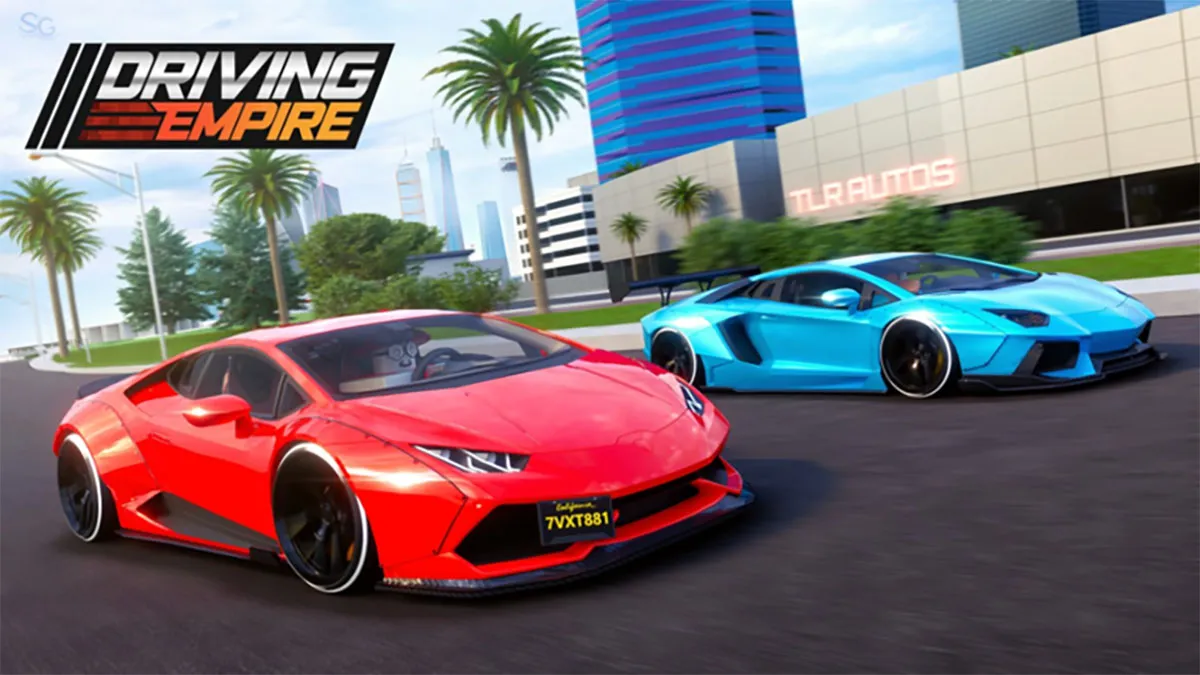






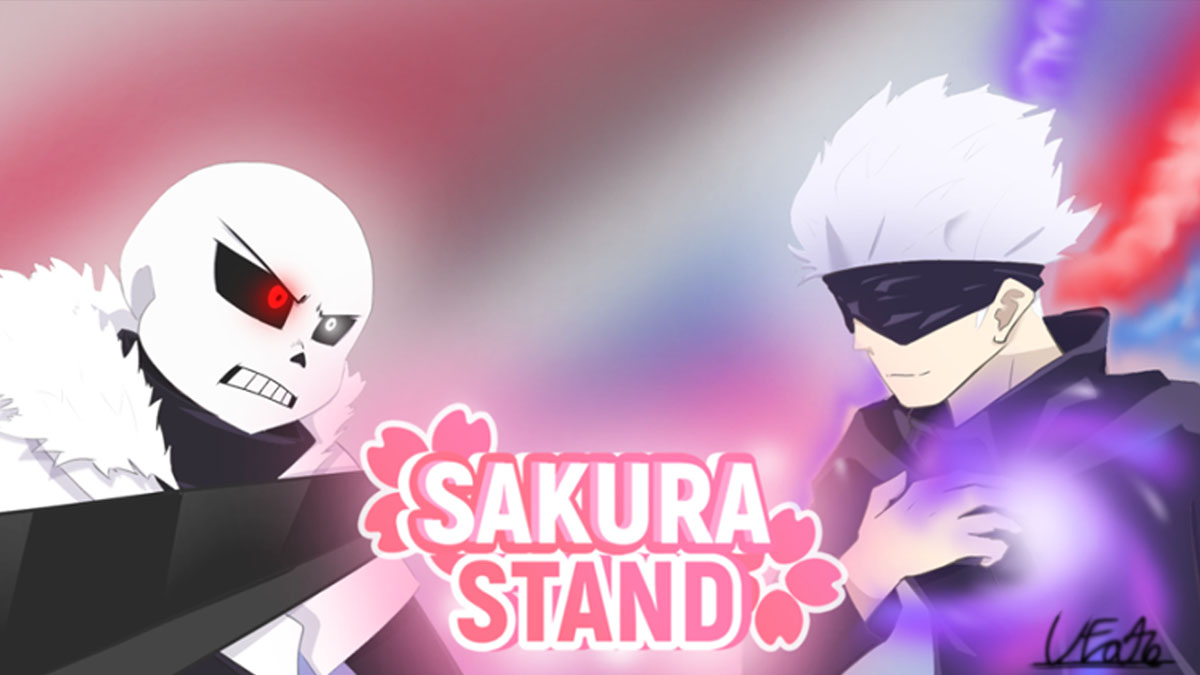
Published: Aug 22, 2022 09:00 am